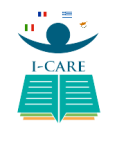Welcome to
i-Care Project
Aim
The aim of the i- Care project is to develop the appropriate training material in order for formal and informal caregivers to acquire and/or enhance their social (soft skills) and ICT skills (and basic healthcare skills for informal carers) and provide open access to innovative electronic educational resources,
The objectives of I-CARE is to provide:
Free Access to Open Educational Resources
Knowledge and skills: Increased specialization for caregivers
Welcome to i-Care Project
Formal provision for focused education and professionalization of Personal Health Services since a skilled home-worker sector is critical to driving forward the agenda of improving the quality of life for people in need and boost employment in this sector as well as improving employees well being. This critical issue seems to be underestimated in the tertiary education since official curriculums in Universities (i.e. Italy,France) lack 2 strands of skills widely recognized basic professional asset for a carer: ICT and Social skills.
In addition, we note that informal caregivers representing the largest part of the market in Greece and in Cyprus lack of basic skills training. In these two countries, informal care is common (70% to 85%) and no training exist for this population who lack of professionalization .
The basic education of nurses (formal carers) in Greece, Cyprus, France and Italy is more centred upon the provision of “technical” knowledge (healthcare techniques, medication, etc) than directed towards the teaching of social skills (crises management, awareness etc.). In fact, in France around 20 different professions are considered as caregivers and they lack of social skills( Cubert, 2013). Caregivers in Italy are the practitioners certified in accordance with Law 43/2006. Professions with servants and auxiliary functions are trained by Regions. However, there are only few trainings for informal care in Italy. In France, the National Healthcare Territorial Scheme (2014) points out the lack of certification of informal migrant caregivers. Generally, the access on the market is difficult for 55% of informal carers in Europe.
Especially during crisis, some soft skills need to be improved. The Eurofound report on Greece, Italy and Cyprus (2014) points the isolation of carers and their increased needs for stress management and enhanced communication with families in crisis.
The use of ICTs is a cost-effective way to improve the quality of care provided to dependent people, to ease the burden on informal caregivers and family-employed care assistants, and improve the quality of life of both groups. Currently, public and private organizations providing healthcare services face a gap between offer and demand of specialized and qualified employees; a gap that is expected to grow even further in the next years, as a lot of healthcare subsectors have been titled "markets of the future" (Telemedicine, AAL) and as the management process of complex coordinate healthcare systems (such as specialized health networks, large community organizations etc) is increasingly urgent. Despite this increase further specific ICT related education for people working in the area has not been anticipated and is still massively lagging behind according to ESCO "health and social" group (2013).
The development of basic skills in specific diseases (f.ex. cancer and mental disability) is crucial for a more equitable integration of the informal caregivers in the market. In the same line it seems that incorporating the potential of ICT skills (online management, etc) in this rapidly growing sector could boost substantially employment in this sector. In parallel, Social skills (such as emotional intelligence, empathy etc) in the social and health sector are increasingly being recognized as valuable and necessary skills for nurses.




